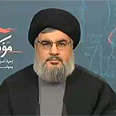
Report: CIA forced to curb spying in Lebanon, Iran
Central Intelligence Agency concerned by fate of 12 undercover agents arrested in Beirut, Tehran; CIA blamed for 'getting sloppy'
The CIA's operations in Lebanon have been badly damaged after Hezbollah identified and captured a number of US spies recently, current and former US officials said on Monday.
Hezbollah's longtime leader Hassan Nasrallah boasted on television in June that he had rooted out at least two CIA spies who had infiltrated the ranks of Hezbollah, which the US considers a terrorist group closely allied with Iran.
Related stories:
- Spy ring 'shocks' Hezbollah Report: Hezbollah opens base in Cuba
- Hezbollah uses scare tactics on journalists
Though the US Embassy in Lebanon officially denied the accusation, current and former officials concede that it happened and the damage has spread even further.
In recent months, CIA officials have secretly been scrambling to protect their remaining spies – foreign assets or agents working for the agency – before Hezbollah can find them.
To be sure, some deaths are to be expected in shadowy spy wars. It's an extremely risky business and people get killed. But the damage to the agency's spy network in Lebanon has been greater than usual, several former and current US officials said, speaking on condition of anonymity because they were not authorized to speak publicly about security matters.
'CIA getting sloppy'
The Lebanon crisis is the latest mishap involving CIA counterintelligence, the undermining or manipulating of the enemy's ability to gather information.
Former CIA officials have said that once-essential skill has been eroded as the agency shifted from outmaneuvering rival spy agencies to fighting terrorists. In the rush for immediate results, former officers say, tradecraft has suffered.
Last year, then-CIA director Leon Panetta said the agency had to maintain "a greater awareness of counterintelligence." But eight months later, Nasrallah let the world know he had bested the CIA, demonstrating that the agency still struggles with this critical aspect of spying and sending a message to those who would betray Hezbollah.
The CIA was well aware the spies were vulnerable in Lebanon. CIA officials were warned, including the chief of the unit that supervises Hezbollah operations from CIA headquarters in Langley, Virginia, and the head of counterintelligence.
It remains unclear whether anyone has been or will be held accountable in the wake of this counterintelligence disaster or whether the incident will affect the CIA's ability to recruit assets in Lebanon.
US official said Hezbollah is recognized as a complicated enemy responsible for killing more Americans than any other terrorist group before September 2001. The agency does not underestimate the organization, the official said.
Last year, the State Department described Hezbollah as "the most technically capable terrorist group in the world," and the Defense Department estimates it receives between $100 million and $200 million per year in funding from Iran.
Spy-hunters at play
Backed by Iran, Hezbollah has built a professional counterintelligence apparatus that Nasrallah – whom the US government designated an international terrorist a decade ago – proudly describes as the "spy combat unit." Using the latest commercial software, Nasrallah's spy-hunters unit began methodically searching for spies in Hezbollah's midst.
A string of 2009 arrests of Israeli assets in Lebanon alarmed senior officials back at CIA headquarters, and the agency prepared a study on its own vulnerabilities. The results proved to be prescient.
The analysis concluded that the CIA was susceptible to the same analysis that had compromised the Israelis, the officials said.
Still, it is unclear what preventive measures were taken by the Hezbollah unit chief or the officer in charge of the Beirut station. Former officials say the Hezbollah unit chief is no stranger to the necessity of counterintelligence and knew the risks.
This allowed Hezbollah to identify assets and case officers and unravel at least part of the CIA's spy network in Lebanon. There was also a reluctance to share cases and some files were put in "restricted handling."
Nasrallah's televised announcement in June was followed by finger-pointing among departments inside the CIA as the spy agency tried figure out what went wrong and contain the damage.
The fate of these CIA assets is unknown. Hezbollah treats spies differently, said Matthew Levitt, a counterterrorism and intelligence expert at the Washington Institute for Near East Studies who's writing a book about the terrorist organization
"It all depends on who these guys were and what they have to say," Levitt said. "Hezbollah has disappeared people before. Others they have kept around."
- Receive Ynetnews updates directly to your desktop










